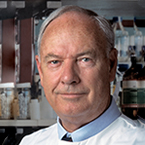
Donald Metcalf, MD, professor emeritus at the University of Melbourne and Carden fellow in cancer research in the Division of Cancer and Hematology at the Walter and Eliza Hall Institute of Medical Research in Melbourne, Australia, died December 15, 2014, at the age of 85. An honorary member of the AACR since 1958, Metcalf was elected to the AACR Academy of Fellows inaugural class in 2013. His work revolutionized the understanding of many blood cell diseases and their treatment.
Metcalf was known as the “father of modern hematology” for his pioneering work on the control of blood cell formation and the control of leukemic cells; Metcalf co-developed a series of specialized culture techniques that allowed the growth of various types of blood cells in 1965. He then discovered colony-stimulating factors, which are hormones that control white blood cell formation, thus resistance to infection. He and his colleagues then discovered the effectiveness of two primary white blood cell regulators-granulocyte-macrophage colony-stimulating factors and granulocyte colony-stimulating factors’ in accelerating the regrowth of blood cells following anticancer treatments and bone marrow or peripheral blood transplants. These findings have now successfully benefited millions of patients worldwide.
Metcalf’s recent work led to the development of a new blood cell regulator, leukemia inhibitory factor, which acts on multiple tissues in the body and on the SOCS family of genes, which control blood cell responses to cytokines.
Born Feb. 26, 1929, he joined the Walter and Eliza Hall Institute of Medical Research in 1954 and worked there until his retirement in September 2014. In 2013, the inaugural Metcalf chair of leukemia research was created as a joint appointment between the institute, the University of Melbourne, and the Royal Melbourne Hospital, in his honor.
Metcalf has received many additional honors and awards, including the AACR Lifetime Achievement Award in Cancer Research; the Lasker-DeBakey Clinical Medicine Research Award; the Royal Medal from the Royal Society in the United Kingdom, of which he was also an elected fellow; the inaugural Salk Institute Prize for Research Excellence; and Companion of the Order of Australia.
Be the first to add a Remembrance.